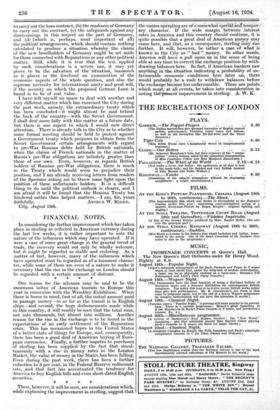FINANCE—PUBLIC & PRIVATE.
[Ry OUR CITY EDITOR.]
CONFERENCE HOPES: THE RUSSIAN TREATY.
[To the Editor of the SPECTATOR.] Sin,—The main features of the past week as affecting the City have been of a divergent character. Inasmuch as the Stock Exchange usually takes short views, there [las been no disposition to concentrate very much upon the Irish Eituation, which has been regarded rather as something which can be pigeon-holed until the re- assembling of Parliament, although, of -course, the unpleasant possibilities in that direction are not alto- gether ignored. The main factor, therefore, operating during the week has been the continuance of hopes with regard to the outcome of the European Confer- ence, and inasmuch as there have been indications that even the thorny problem of the Ruhr evacuation may be solved, hopefulness has been the prevailing note, and securities have been firm in almost every department. This, of course, is exactly in accordance with the con- ditions which had always been expected would, at the outset, accompany any passing of the Reparation crisis; and assuming that the crisis is really solved and that the financial reconstruction of Germany commences, it is not until a little later on that there may be a ten- dency to shift from high-class investment securities into stocks giving a higher yield of interest, in the expectation of an increase in international trade involving a rise in money rates.
At the same time, while it may fairly be hoped that optimism with regard to the ultimate outcome of the Conference will be found to be justified, it would seem, that, in some respects, there is rather a tendency to go ahead somewhat of actual events. Judging from some of the cables of the past week, for example, it might be supposed that the flotation of the German loan for 140,000,000, which is required to carry out the recommendations of the Dawes Report, was actually imminent. So far from such being the case, I should imagine that, even at the present stage, it is this loan which is proving to be the most severe test of the various decisions reached by the Con- ference. To express the point very simply, I might say that supposing the acceptance of the Dawes' Report in no way involved a German loan to be offered to the investor, the final published decisions of the Conference would then be exposed only to criticisms of a national or political character. With a German loan in prospect, however, not only have the reasonable requirements of France and other countries as regards national security to be satisfied, but the potential investor in the new loan has to receive clear and definite assurance as to (a) the ability of Germany (Continued on page 236.) to carry out the loan contract, (b) the readiness of Germany' to carry out the contract, (c) the safeguards against any shortcomings in this respect on the part of Germany, and (d) (which is, perhaps, most important of all) the political arrangements, which should contain nothing calculated to produce a situation whereby the claims of the new bondholders of Germany might be set aside for those connected with Reparations or any other political. matter. Still, while it is true that the test applied by such considerations is a severe one, 'it may yet prove to be the salvation of -the situation, inasmuch as it places in the forefront an examination of the economic aspects of the whole question, and also the supreme necessity for international amity and good will, if the security on which the proposed German Loan is based is to be of real value.
I have left myself no space to deal with another and very different matter which has exercised the City during the past week, namely, the extraordinary treaty which has been concluded—it might almost be said behind the back of the country—with the Soviet Government.' I shall deal more fully with this matter at a future date, but there is one aspect to which I would now direct attention. There is already talk in the City as to whether some formal meeting should be held to protest against a Government treaty which proposes to obtain from the Soviet Government certain arrangements with regard to pre-War Russian debts held by British nationals, when the claims of French nationals in the matter of Russia's pre-War obligations are infinitely greater than those of our own. Even, however, as regards British holders of Russian pre-War obligations, there is much in the Treaty which would seem to prejudice their position, and I am already receiving letters from readers of the Spectator asking me to throw some light upon the position of these unfortunate holders. It is a difficult thing to do until the political outlook is clearer, and I am afraid it will be found that the Russian Treaty has hindered rather than helped matters.—I am, Sir, yours



































 Previous page
Previous page